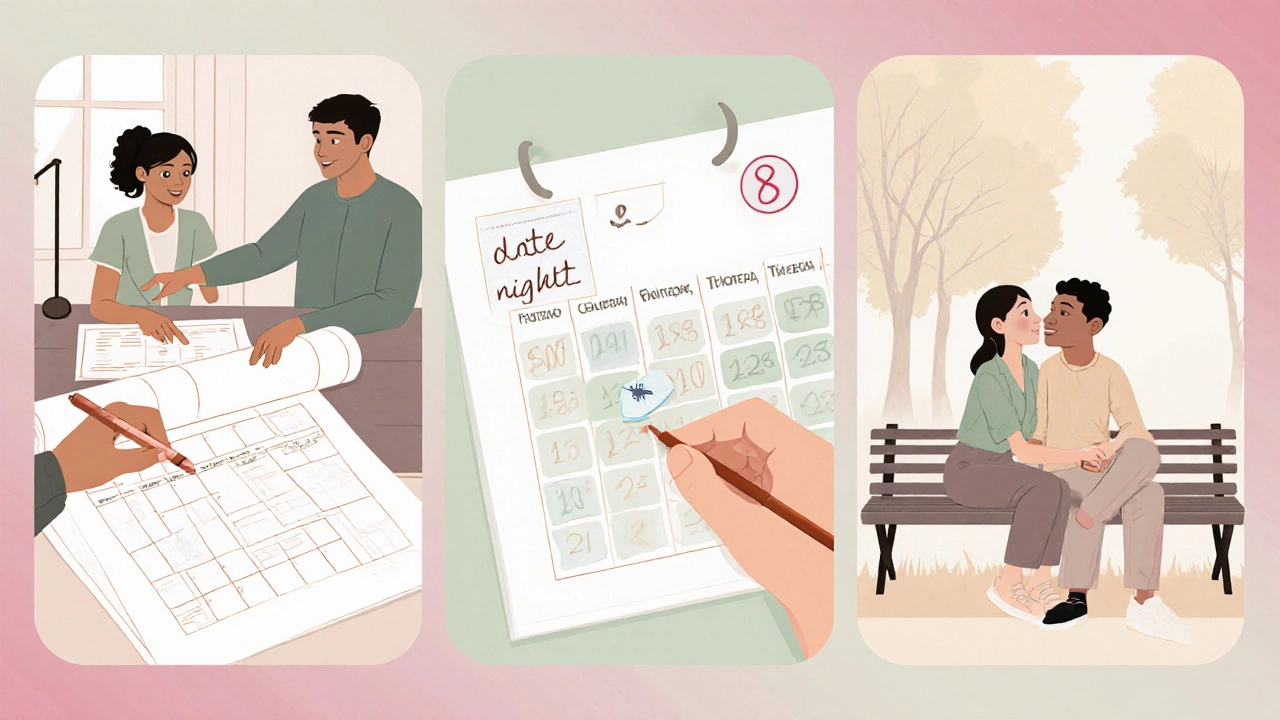Stage 5 in a Relationship: Understanding the Commitment Phase
 Oct, 22 2025
Oct, 22 2025
Ever wondered why some couples feel like they’ve hit a permanent "home base" while others keep cycling through drama? That sweet spot usually marks stage 5 in a relationship - the commitment phase where love stops being a roller‑coaster and starts feeling like a steady walk together.
What are Relationship Stages?
Before diving into stage 5, it helps to see the whole map. Relationship experts often break romantic journeys into five distinct phases. Each stage has its own vibe, challenges, and milestones.
Relationship stages are a sequence of emotional and behavioral shifts that couples typically experience from the first spark to long‑term partnership. Though every couple is unique, most follow a recognizable pattern.
Stage 1 - Infatuation
Stage 1 (Infatuation) is the "honeymoon" period where dopamine floods the brain, making everything feel exciting and new. Butterflies, constant texting, and day‑dreaming dominate. This stage usually lasts a few weeks to a couple of months.
Stage 2 - Romantic Love
Stage 2 (Romantic Love) deepens emotional intimacy. Couples start sharing personal stories, values, and future hopes. Passion stays high, but the intense novelty of stage 1 begins to wane, replaced by a desire for deeper connection.
Stage 3 - Reality
Stage 3 (Reality) is where the "perfect" image meets everyday life. Differences surface, and couples learn how to negotiate responsibilities, finances, and habits. Conflict is normal, but it’s a key learning ground.

Stage 4 - Stagnation
Stage 4 (Stagnation) feels like a plateau. Energy may dip, routines harden, and partners might wonder if the spark is gone. This stage is often a turning point: either couples slip into disengagement or they decide to grow together.
Stage 5 - Commitment
Stage 5 (Commitment) marks the transition from "being together" to "being a team". Here, trust, shared goals, and long‑term planning become the cornerstones. The relationship is no longer defined solely by feelings, but by deliberate choices to stay together.
Commitment isn’t a static status; it’s an active practice that involves continuous effort, communication, and growth.
Key Signs You’re in Stage 5
- Both partners discuss future milestones like buying a home, retirement, or children as joint projects.
- Conflict resolution focuses on "what’s best for us" rather than "who’s right".
- There’s a solid safety net of trust; sharing insecurities feels safe.
- Routines become rituals that strengthen the bond, such as weekly date nights or shared hobbies.
- Each person feels comfortable pursuing individual interests, knowing the partnership supports personal growth.

How to Nurture Commitment
Reaching stage 5 is a milestone, but staying in it requires intentional habits.
- Practice Transparent Communication: Share fears, hopes, and daily experiences without fear of judgment.
- Re‑evaluate Goals Together: Check‑in on career plans, financial objectives, and family desires at least twice a year.
- Invest in Emotional Safety: Celebrate each other's successes, and be the first to apologize when you slip.
- Maintain Physical Intimacy: Small gestures-hand‑holds, kisses, cuddles-keep the love hormone flow alive.
- Celebrate Milestones: Whether it’s a work promotion or a simple anniversary, marking achievements reinforces partnership.
Common Pitfalls in the Commitment Phase
Even in stage 5, couples can stumble. Knowing the traps helps you avoid them.
- Complacency: Assuming the relationship will sustain itself without active effort.
- Unspoken Expectations: Assuming your partner knows what you need without saying it out loud.
- Neglecting Individual Growth: Over‑prioritizing the couple at the expense of personal ambitions.
- Skipping Conflict Resolution: Letting resentment build instead of addressing issues early.
Comparison of All Five Stages
| Stage | Main Emotion | Typical Duration | Key Challenge | Typical Behaviors |
|---|---|---|---|---|
| Infatuation | Excitement | Weeks‑to‑months | Idealization | Constant texting, day‑dreaming |
| Romantic Love | Passion | Months‑to‑1 year | Deepening intimacy | Sharing values, future talk |
| Reality | Adjustment | 1‑2 years | Conflict management | Negotiating finances, chores |
| Stagnation | Plateau | Variable | Renewal or decline | Routine, questioning future |
| Commitment | Security | Long‑term | Maintaining growth | Joint planning, trust building |
Frequently Asked Questions
How long does stage 5 usually last?
Stage 5 can last for the rest of a couple’s life if they keep investing in trust, communication, and shared goals. It’s less about a set time and more about ongoing effort.
Can a couple skip stages and jump straight to commitment?
Rarely. Most people need the earlier phases to build emotional safety and understand each other's quirks. Skipping can lead to fragile foundations.
What role does Trust play in stage 5?
Trust is the glue. It lets partners be vulnerable, discuss finances, raise kids, and plan for the future without fear of betrayal.
Is it normal to feel a dip in excitement during commitment?
Yes. The dopamine rush fades, but a deeper sense of security and satisfaction replaces it. Couples often find new excitement in shared projects.
How can couples rekindle romance without leaving stage 5?
Schedule novelty dates, learn a new skill together, or revisit early‑stage memories. The key is deliberate effort, not waiting for chemistry to reboot on its own.